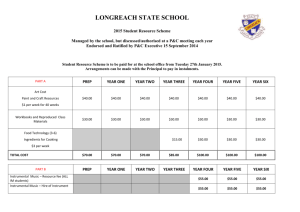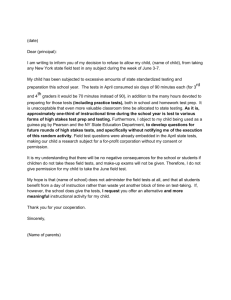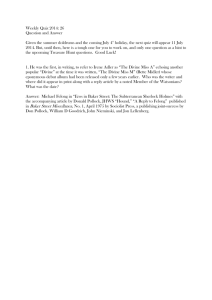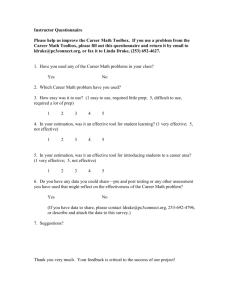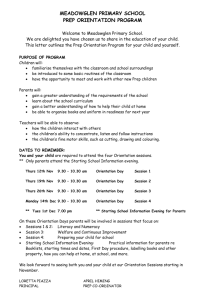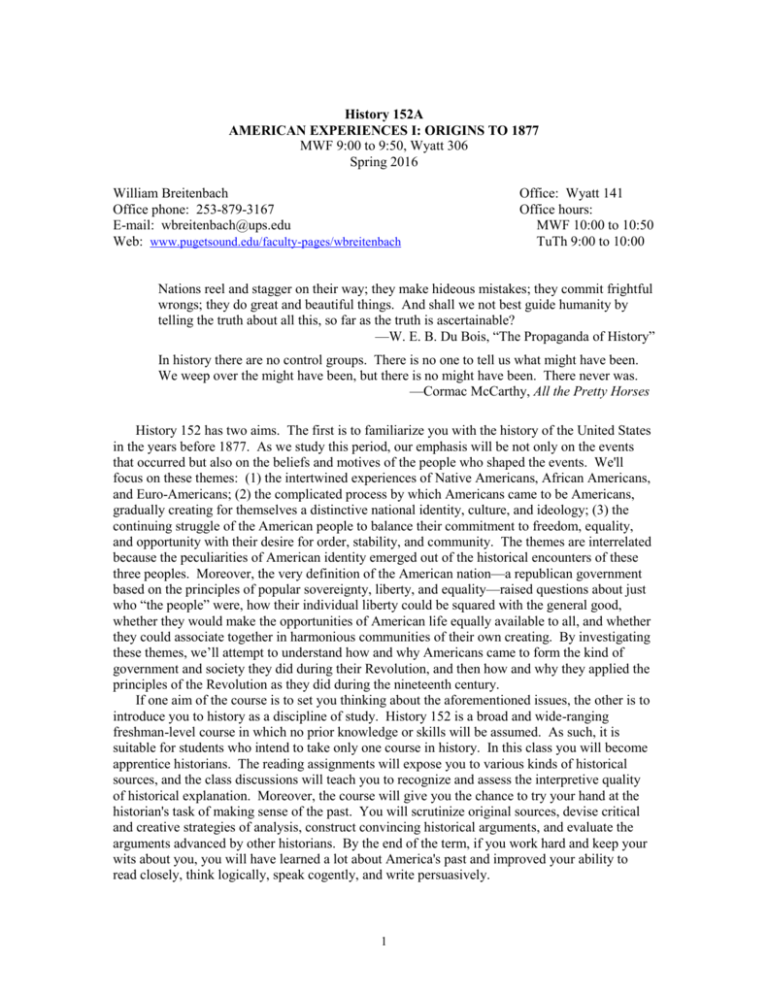
History 152A
AMERICAN EXPERIENCES I: ORIGINS TO 1877
MWF 9:00 to 9:50, Wyatt 306
Spring 2016
William Breitenbach
Office phone: 253-879-3167
E-mail: wbreitenbach@ups.edu
Web: www.pugetsound.edu/faculty-pages/wbreitenbach
Office: Wyatt 141
Office hours:
MWF 10:00 to 10:50
TuTh 9:00 to 10:00
Nations reel and stagger on their way; they make hideous mistakes; they commit frightful
wrongs; they do great and beautiful things. And shall we not best guide humanity by
telling the truth about all this, so far as the truth is ascertainable?
—W. E. B. Du Bois, “The Propaganda of History”
In history there are no control groups. There is no one to tell us what might have been.
We weep over the might have been, but there is no might have been. There never was.
—Cormac McCarthy, All the Pretty Horses
History 152 has two aims. The first is to familiarize you with the history of the United States
in the years before 1877. As we study this period, our emphasis will be not only on the events
that occurred but also on the beliefs and motives of the people who shaped the events. We'll
focus on these themes: (1) the intertwined experiences of Native Americans, African Americans,
and Euro-Americans; (2) the complicated process by which Americans came to be Americans,
gradually creating for themselves a distinctive national identity, culture, and ideology; (3) the
continuing struggle of the American people to balance their commitment to freedom, equality,
and opportunity with their desire for order, stability, and community. The themes are interrelated
because the peculiarities of American identity emerged out of the historical encounters of these
three peoples. Moreover, the very definition of the American nation—a republican government
based on the principles of popular sovereignty, liberty, and equality—raised questions about just
who “the people” were, how their individual liberty could be squared with the general good,
whether they would make the opportunities of American life equally available to all, and whether
they could associate together in harmonious communities of their own creating. By investigating
these themes, we’ll attempt to understand how and why Americans came to form the kind of
government and society they did during their Revolution, and then how and why they applied the
principles of the Revolution as they did during the nineteenth century.
If one aim of the course is to set you thinking about the aforementioned issues, the other is to
introduce you to history as a discipline of study. History 152 is a broad and wide-ranging
freshman-level course in which no prior knowledge or skills will be assumed. As such, it is
suitable for students who intend to take only one course in history. In this class you will become
apprentice historians. The reading assignments will expose you to various kinds of historical
sources, and the class discussions will teach you to recognize and assess the interpretive quality
of historical explanation. Moreover, the course will give you the chance to try your hand at the
historian's task of making sense of the past. You will scrutinize original sources, devise critical
and creative strategies of analysis, construct convincing historical arguments, and evaluate the
arguments advanced by other historians. By the end of the term, if you work hard and keep your
wits about you, you will have learned a lot about America's past and improved your ability to
read closely, think logically, speak cogently, and write persuasively.
1
History 152
Spring 2016
READINGS
Books (for sale at the campus bookstore; ones with an asterisk are also on library reserve)
Robert A. Divine et al., The American Story, 4th ed., vol. 1 (Pearson Longman)*
William Breitenbach, History 152 Readings Packet [You’ll need your own copy of this book.]
Black Hawk, Life of Black Hawk (Dover)*
Frederick Douglass, Narrative of the Life of Frederick Douglass (Dover)*
Pauli Murray, Proud Shoes: The Story of an American Family (Beacon)*
Useful materials on library reserve:
Neil R. Stout, Getting the Most out of Your U.S. History Course
Mary Lynn Rampolla, A Pocket Guide to Writing in History, 6th ed.
Michael Harvey, The Nuts and Bolts of College Writing
Laurie G. Kirsner and Stephen R. Mandell, The Pocket Holt Handbook [advice on grammar,
mechanics, writing essays, paper format, footnotes, etc.]
Write the "A" College Exam Answer [advice on studying for and taking essay exams]
Moodle website
A few readings have been posted on the Moodle website for this course. You can login to
Moodle at https://moodle.pugetsound.edu/moodle/login/index.php. I’ll also place on Moodle the
syllabus, paper assignments, exam prep sheets, and other useful information and advice.
PROCEDURES AND REQUIREMENTS
Class participation
This will be a discussion class. That means everyone needs to show up on time with the
reading assignment completed and ideas to talk about. To help you get ready for class, I have
provided “prep” questions in the syllabus for each session. I urge you to take notes, reducing the
main points of each reading and class discussion to what you can write on a 3x5 index card. Bring
the day’s assigned books to class, so you can refer to particular passages during discussions.
In class it’s your job to put your ideas out there for classmates to endorse, challenge, and
transform. Be willing to ask questions, confess confusion, take a stand, and change your mind
when presented with better evidence or reasoning. Listen attentively and respond respectfully to
what your classmates have to say. Speaking directly to them (rather than through me) is a way of
showing that you take them and their ideas seriously. Staring raptly at an electronic screen,
without typing notes or looking up at speakers, shows that you don’t.
Your regular participation will be important in determining both the success of the course and
the grade you receive in it. After every class, I’ll evaluate your contribution to other students’
learning. Students who make outstanding contributions will get a 4, those who contribute
significantly will get a 3, those who attend and listen but say little will get a 2, those whose
behavior makes it harder for themselves or others to learn (by arriving late, eating noisily, texting,
erecting a laptop wall, leaving the classroom, etc.) will get a 1, and those who miss class will get a
0. I have adopted this system to get out of the unprofitable business of evaluating absentees’
excuses and into the more rewarding business of evaluating contributions made by students who
are present. Hence, in History 152 there are no such things as excused or unexcused absences. If
you miss a class, for whatever reason, the way to “make up” the absence is by speaking out and
sharing your insights in the classes you do attend. At the end of the semester, the daily scores will
be used to calculate a participation grade, which will count for 20% of the course grade.
2
History 152
Spring 2016
Removal from course for nonattendance
When a student misses more than 20% of the classes (in this course, that’s more than 8
absences), I have qualms about putting a grade on a transcript testifying to the world that the
student has performed adequately in my course. In such cases, I may ask the Registrar to
withdraw the student from the course, which will result in a grade of W or WF, depending on the
time of the semester and/or the quality of the work that has been completed to that point.
Papers and examinations. There are five graded writing assignments in this course. Paper
assignment sheets and exam prep sheets will be provided well before the due dates.
a 2-page paper, due at Wyatt 141 by 4:00 p.m. on Friday, February 5 (counts 5%).
a 3-page paper, due at Wyatt 141 by 4:00 p.m. on Friday, February 19 (counts 10%).
a midterm examination, given during class on Friday, March 4 (counts 20%).
a 7-page paper, due at Wyatt 141 by 4:00 p.m. on Monday, April 18 (counts 25%).
a final examination, held in our regular classroom on Wednesday, May 11, from 8:00 to
10:00 a.m. (counts 20%). You must take your final examination at this scheduled time.
Grading
Grade ranges are A (93-100), A- (90-92), B+ (87-89), B (83-86), B- (80-82), C+ (77-79),
C (73-76), C- (70-72), D+ (67-69), D (63-66), D- (60-62), and F (below 60). I will round up to a
higher letter grade when the numerical score is within 0.2 points of the cut-off (e.g., 89.8 to A-).
Studying and writing help
The Center for Writing, Learning, and Teaching is located in Howarth 109. Its mission is to
help all writers, whatever their level of ability, become better writers. To make an appointment,
call 879-3404, email writing@ups.edu, or drop by Howarth 109.
Harvard University’s Writing Center has a website with useful advice on writing academic
essays: http://www.fas.harvard.edu/~wricntr/. Click on “Writing Resources” and then on
“Strategies for Essay Writing” to find eighteen online “handouts.”
Extensions, late work and missing work
Normally I grant make-ups, extensions, or “Incomplete” grades only for weighty reasons
like a family emergency or a serious illness. But if you are facing circumstances beyond your
control that might prevent you from finishing a paper or taking an exam on time, ask me in
advance of the deadline for an extension. (Extensions are prospective, not retroactive; that is, an
extension granted after the deadline does not cancel the penalty that has already accrued.) If
appropriate, provide written documentation supporting your request from a medical professional;
the Counseling, Health, and Wellness Services; the Academic Advising Office; the Office of
Student Accessibility and Accommodations; or the Dean of Students Office.
Late papers should be emailed to me as Word documents at wbreitenbach@pugetsound.edu.
Late papers will be marked down 3.5 points on a 100-point scale (about ⅓ of a letter grade) if
turned in during the first 24 hours after the deadline. If turned in during the second 24 hours, there
will be an additional penalty of 6.5 points (about ⅔ of a letter grade). For each additional 24-hour
period, the paper will lose 10 points (equivalent to a full letter grade), until the points reach 0.
Other policies
If you have a physical, psychological, medical, or learning disability that may impact your
course work, contact Peggy Perno, Director of Student Accessibility and Accommodations, at
105 Howarth Hall, 253-879-3395. She will determine with you what accommodations are
necessary and appropriate. All information is confidential. Accommodations are not retroactive.
3
History 152
Spring 2016
Students who want to withdraw from the course should read the rules for withdrawal grades
in the Academic Handbook (link provided below). Friday, April 1, is the last day to drop with an
automatic W; thereafter it is much harder to avoid a WF. Students who abandon the course
without officially withdrawing will receive a WF.
Students who cheat or plagiarize, help others do so, deface or steal library materials, or
otherwise violate the university’s standards of academic integrity will get an F for the course and
will be reported to the Registrar. Before turning in your first paper, read the section on
“Academic Integrity” in the Academic Handbook (link provided below). Ignorance of the
concept or consequences of plagiarism will not be accepted as an excuse.
In these and all other matters, I follow the policies in the current Academic Handbook, at
http://www.pugetsound.edu/student-life/personal-safety/student-handbook/academic-handbook/.
Classroom Emergency Response Guidance
Please review university emergency preparedness and response procedures posted at
www.pugetsound.edu/emergency/. There is a link on the university home page. Familiarize
yourself with hall exit doors and the designated gathering area for your class buildings.
If building evacuation becomes necessary (e.g., because of an earthquake), meet your
instructor at the designated gathering area outdoors so she/he can account for your presence.
Then wait for further instructions. Do not return to the building or classroom until advised by a
university emergency response representative.
If confronted by an act of violence, be prepared to make quick decisions to protect your safety.
Flee the area by running away from the source of danger if you can safely do so. If this is not
possible, shelter in place by securing classroom doors and windows, closing blinds, and turning off
room lights. Lie on the floor out of sight and away from windows and doors. Place cell phones or
pagers on vibrate so you can receive messages quietly. Wait for further instructions.
CLASS SCHEDULE
Do the reading assignments before the class meeting for which they are listed. Bring this syllabus
and the day’s assigned books to class. Plan to spend a couple of hours preparing for each class.
Week One
1. Wed., Jan. 20: The Shock of the New
Theodore de Bry, engravings of Native Americans from the 1590s (viewed in class)
2. Fri., Jan 22: First Impressions
History 152 Syllabus (This is your agreement with me. Read it!)
Divine, American Story, xxii-xxiv, 1-11, 14-28
History 152 Readings Packet:
Thomas Hariot, Brief and True Report, 3-6
Robert Johnson, Nova Britannia, 6-8
Prep: What were the expectations, intentions, and goals of the English? What view did
the English have of the Indians? Did the English truly desire a biracial community?
Week Two
3. Mon., Jan. 25: Cultural Collisions: The English and the Indians
Divine, American Story, 29-39
History 152 Readings Packet:
John Smith, Proceedings of the English Colony, 8-9
Edward Waterhouse, Declaration of the State of the Colony, 10-12
4
____________
History 152
Spring 2016
Prep: Why did English hopes for a harmonious biracial community collapse by 1622?
How can we use Smith’s document to get at Powhatan’s view of the English? What
inferences can you draw from Waterhouse’s response to the 1622 attack?
4. Wed., Jan. 27: Death and Servitude in Early Virginia
____________
Divine, American Story, 48-58
History 152 Readings Packet:
Three Demographic Tables, 13-14
Capt. Thomas Dale’s Laws, 15-17
Virginia Company, Letter to the Governor, 17-18
Richard Frethorne, Letter to His Father and Mother, 18-20
Prep: In what ways were Dale’s Laws a response to the conditions of life revealed by the
other documents? Why is it not surprising that slavery eventually arose in Virginia?
5. Fri., Jan. 29: The Emergence of Slavery
____________
Divine, American Story, 11-14, 65-72
History 152 Readings Packet:
Virginia Slavery Legislation, 20-23
Olaudah Equiano, Interesting Narrative, 24-25
Prep: How did slavery differ from indentured servitude? Why do historians care about
whether racism caused slavery or slavery caused racism. What do the laws show?
Week Three
6. Mon., Feb. 1: Winthrop and Puritan Social Ideals
Last day to drop without record
Divine, American Story, 40-47
History 152 Readings Packet:
____________
John Winthrop, Model of Christian Charity, 26-28
John Winthrop, Speech to the General Court, 29-30
Prep: Which colony would be more likely to succeed—Virginia or Massachusetts? Why?
Compare Winthrop’s Model to Dale’s Laws. What was Winthrop’s purpose in
delivering his Model? Who was his intended audience? Did the argument in his
Speech to the General Court contradict the argument in his Model?
7. Wed., Feb. 3: Shepard’s Religious Experience: The Way to Salvation
____________
Divine, American Story, 59-65
History 152 Readings Packet: Thomas Shepard, Autobiography, 31-33
Prep: What was the appeal of Puritanism? Why was Shepard dissatisfied with each new
stage of his religious awakening? Is there a logical (or perhaps a psychological)
connection between Winthrop’s social ideals and Shepard’s religious experience?
8. Fri., Feb. 5: The Salem Witchcraft Crisis: The Way to Damnation
____________
Divine, American Story, 72-80
History 152 Readings Packet:
Deodat Lawson, Brief and True Narrative of Witchcraft, 34-39
The Case against Sarah Good, 40-43
Samuel Parris, Christ Knows How Many Devils There Are, 44-46
The Confession of William Barker, 47
The Petition of Mary Easty, 48
Prep: Why did the witchcraft crisis occur? Why did it occur in the way that it did? Did
the witchcraft crisis reveal the abandonment or the persistence of Winthrop’s ideals?
5
History 152
Spring 2016
Paper Due: Friday, February 5, by 4:00 p.m. in my office, Wyatt 141.
Week Four
9. Mon., Feb. 8: Nathan Cole and the Great Awakening
____________
Divine, American Story, 81-90, 94-97
History 152 Readings Packet: Nathan Cole, Spiritual Travels, 49-53
Prep: Compare the Great Awakening to the witchcraft crisis. Was the Great Awakening
a conservative or a radical event? Would Winthrop have approved of Cole?
10. Wed., Feb. 10: Benjamin Franklin and the Way to Success
____________
Divine, American Story, 90-94, 97-111
History 152 Readings Packet: Benjamin Franklin, Autobiography, 54-59
Prep: In what ways was Franklin like and unlike the Puritans? How did his project for
achieving moral perfection differ from Puritans’ conversion experiences? Who
was the greater threat to Winthrop’s values—Cole or Franklin?
11. Fri., Feb. 12: Paine’s Work of Destruction and Construction
____________
Divine, American Story, 111-33
History 152 Readings Packet: Thomas Paine, Common Sense, 60-64
Declaration of Independence, in Divine, American Story, Appendix A1-A3
Preamble to the Constitution, in Divine, American Story, Appendix, A4
Prep: What were the practical, cultural, and psychological obstacles to declaring
independence? How did Paine’s pamphlet help Americans overcome them?
Compare Paine’s ideas about government and liberty with Winthrop’s. What can
account for the astonishing shift in values? Why did the Paine trust the people?
Week Five
12. Mon., Feb. 15: Domestic Revolutions
____________
Divine, American Story, 133-48
History 152 Readings Packet:
Gen. Nathanael Greene, Letter to Catharine Greene, 65
Abigail Adams and John Adams, Three Letters, with Addenda 66-68b
Esther DeBerdt Reed, The Sentiments of an American Woman, 69
New Hampshire slaves, Petition to the New Hampshire Legislature, 84-85
Prep: Was the Revolution revolutionary for women? Were they better or worse off once
“The People” ruled themselves as republican citizens? How did enslaved people
make use of revolutionary ideas in their petition for freedom?
13. Wed., Feb. 17: The Assault on Aristocracy
____________
Divine, American Story, 148-57
History 152 Readings Packet:
Thomas Jefferson, Letter to John Adams on Aristocracy, 78-79
Thomas Jefferson, Virginia Statute for Religious Freedom, 80
William Manning, The Key of Libberty, 81-84
Thomas Jefferson, First Inaugural Address, 86
Prep: How do these documents reveal the radical effects of the Revolution? Which
document is most radical? Was the Revolution’s main goal liberty or equality?
6
History 152
Spring 2016
14. Fri., Feb. 19: Constituting a Federal Republic
____________
Divine, American Story, 157-73
Constitution and the Bill of Rights, in Divine, Appendix, A4-A12
History 152 Readings Packet:
Brutus, To the Citizens of the State of New York, 70-71
James Madison, Federalist, Numbers 10 and 51, 72-77
Prep: What dangers did Brutus and Madison most fear? What were their proposed
remedies? Which of them seems closer to Winthrop’s views on factions?
Paper Due: Friday, February 19, by 4:00 p.m. in my office, Wyatt 141.
Week Six
15. Mon., Feb. 22: Jefferson’s Vision of Republican Society
____________
Divine, American Story, 173-94
History 152 Readings Packet:
Thomas Jefferson, First Inaugural Address, 86 (again)
Thomas Jefferson, Notes on the State of Virginia, 87-94
Prep: Which groups did Jefferson view as potentially eligible for republican citizenship?
Why was Jefferson inconsistent in his attitudes toward Indians and blacks?
16. Wed., Feb. 24: Invading Indian Country
____________
Divine, American Story, 195-205, 254-55
History 152 Readings Packet:
Thomas Jefferson, Secret Message to Congress, 94-95a
Andrew Jackson, Second Annual Message to Congress, 95b-95c
Life of Black Hawk, xix-32 [skip the “Editor’s Preface (1916)” and “Introduction (1916)”]
Prep: What were the goals of Jefferson’s and Jackson’s Indian policies? What were the
goals and tactics of the Sauk in dealings with whites? Why was the Treaty of 1804
so controversial? Why did the Sauk side with the British during the War of 1812?
17. Fri., Feb. 26: Sauk Political Economy
____________
Divine, American Story, 205-19
Life of Black Hawk, 32-55
Prep: How did the economy inside the Sauk nation differ from their external economy
with the whites? How did the Sauk understanding of property differ from whites’
understanding? Why would these differing views of property lead to conflict?
Week Seven
18. Mon., Feb. 29: The Black Hawk War
Divine, American Story, 220-28
Life of Black Hawk, 56-79
____________
History 152 Readings Packet:
James Fenimore Cooper, The Pioneers, 96-98
Prep: What functions did warfare serve in Sauk culture? Why did the Sauk lose the war?
Why was Black Hawk treated as a celebrity when he toured the East?
7
History 152
Spring 2016
19. Wed., Mar. 2: The Market Revolution
____________
Divine, American Story, 228-35
History 152 Readings Packet:
Michael Merrill and Sean Wilentz, “William Manning,” 99a
P. T. Barnum, Struggles and Triumphs, 99b-103a
Paul E. Johnson, A Shopkeeper’s Millennium, 103b-103g
Prep: What was the market revolution? Why were Americans ambivalent about it? Did
it promote Jefferson’s goal of an economically independent citizenry? How did
Barnum’s career and the class struggle over drinking in Rochester exemplify it?
20. Fri., Mar. 4: Midterm Exam. Held during class time in our regular classroom.
Week Eight
21. Mon., Mar. 7: The Republican Factories at Lowell
____________
Divine, American Story, 235-42
History 152 Readings Packet:
Thomas Jefferson, Notes on the State of Virginia, section on “Manufactures,” 93-94
Henry A. Miles, Lowell, As It Was, and As It Is, 104-08
Harriet H. Robinson, Loom and Spindle, 109-12
Prep: Why did Americans fear the social and political consequences of industrialization?
How did the owners of the Lowell factories try to reconcile industrialization with
republicanism? Did they succeed? What did factory workers think about it?
22. Wed., Mar. 9: The Laboring Classes
____________
Divine, American Story, 326-35
History 152 Readings Packet:
Selections from Factory Workers’ Magazines, 113-15
Orestes A. Brownson, The Laboring Classes, 116-18
Prep: Were workers’ grievances economic, social, political, or gendered? Why did
Brownson object to industrialization? Did he look to the future or to the past?
23. Fri., Mar. 11: Democracy and Equality
____________
Divine, American Story, 243-54
History 152 Readings Packet:
James Kent, Speech against Universal Suffrage, 119-20
George S. Camp, Democracy, 120
Frances Trollope, Domestic Manners of the Americans, 121
David Crockett, The Life and Times of Col. David Crockett, 122-23
King Andrew the First (cartoon), 123
George Caleb Bingham, paintings about democratic politics (viewed in class)
Prep: Why did Trollope call the duke’s experience a lesson in republicanism? Why did
Americans brag about political equality when economic inequality was increasing?
Compare Crockett’s views on political leadership with Winthrop’s and Madison’s.
SPRING BREAK: MARCH 14-18
8
History 152
Spring 2016
Week Nine
24. Mon., Mar. 21: Majorities and Minorities in Democratic America
____________
Divine, American Story, 254-65
History 152 Readings Packet:
Alexis de Tocqueville, Democracy in America, 124-25
John L. O’Sullivan, The United States Magazine and Democratic Review, 125-28
John C. Calhoun, A Disquisition on Government, 128-30
Henry David Thoreau, Civil Disobedience, 130-32
Prep: Which did each author consider the greater threat—an oppressive majority or an
oppressive minority? What is each one’s suggested procedure for deciding
conflicts between a majority and a minority?
25. Wed., Mar. 23: Order Internalized: Middle-Class Culture
____________
Divine, American Story, 290-300
History 152 Readings Packet:
Temperance Banner, 133
Maria Monk, Awful Disclosures of Maria Monk, 134-36
Charles Grandison Finney, Lectures on Revivals of Religion, 137
Lyman Cobb, New North American Reader, 138
John S. C. Abbott, The Mother at Home, 139-41
Prep: What dangers did these authors fear? What remedies did they propose? Why was
Monk’s book so popular? How would mothers feel after reading Abbott’s book?
What kind of personality were these writers trying to form in young people?
26. Fri., Mar. 25: Reformers and Their Organizations
____________
Divine, American Story, 300-303
History 152 Readings Packet:
Pennsylvania Hospital for the Insane, Second Annual Report, 141-44
Charles P. McIlvaine, Address to Young Men on Temperance, 144-45
Dorcas Society of Cincinnati, Constitution, 146
Advocate of Moral Reform and Family Guardian, 147-48
Carroll Smith Rosenberg, “Beauty, the Beast and the Militant Woman: A Case Study in Sex
Roles and Social Stress in Jacksonian America,” American Quarterly 23 (Oct. 1971):
562-84 [on Moodle; also on JSTOR, stable URL http://www.jstor.org/stable/2711706]
Prep: Were reformers conservatives or radicals? Did they seek to change individuals or
to change social structures? Were they trying to transform themselves or control
others? Why did they rely on voluntary associations and public opinion?
Week Ten
27. Mon., Mar. 28: Reform Turns Radical: Abolitionism
____________
Divine, American Story, 303-07, 313-20
History 152 Readings Packet:
Declaration of the American Anti-Slavery Society, 149-51a
Leonard L. Richards, “Gentlemen of Property and Standing,” 151b-151d
Angelina Grimké, An Appeal to the Women of the Nominally Free States, 152-153a
Frederick Douglass, Narrative of the Life, vii-xvii (Preface by Garrison; Letter by Phillips)
Prep: How did abolitionism differ from other forms of antislavery? What arguments did
abolitionists use against slavery? What tactics did they employ? What motivated
them? Why did they criticize Northerners? Why did Northerners mob them?
9
History 152
Spring 2016
28. Wed., Mar. 30: Reform Turns Radical: Feminism
____________
Divine, American Story, 308-12
History 152 Readings Packet:
Angelina Grimké, An Appeal to the Women, 152-153a (read it again)
General Ass’n of Massachusetts Congregational Ministers, “Pastoral Letter,” 153b
Elizabeth Cady Stanton, Eighty Years and More: Reminiscences, 153c
Marriage Vows of Lucy Stone and Henry B. Blackwell, 153d
Margaret Fuller, Woman in the Nineteenth Century, 153e
Seneca Falls Declaration of Sentiments, 154-55a
Elizabeth Cady Stanton, Two Addresses to the New York Legislature, 155b-55f
John Humphrey Noyes, Bible Communism, 156-60
Prep: Why did abolitionism lead to feminism? How did the Seneca Falls Declaration go
beyond the position taken by the female moral reformers? Was Noyes’s argument
the logical extension of abolitionist and feminist principles?
29. Fri., Apr. 1: Slave Masters and Paternalism
Last day to drop with automatic W
Divine, American Story, 276-89
History 152 Readings Packet:
_____________
George Fitzhugh, Cannibals All! 161-63
Bennet H. Barrow, Diary, 164-67
Mary Boykin Chesnut, Diary, 168-70
Prep: Was Fitzhugh another Winthrop? Was paternalism a restraint on oppression or a
form of it? Why were the Chesnuts shaken when slaves murdered Cousin Betsey?
Week Eleven
30. Mon., Apr. 4: Slaves and Resistance
____________
Divine, American Story, 266-76
History 152 Readings Packet:
Mattie J. Jackson, Recollections of Slavery, 171
Ophelia Settle Egypt, Recollections of Slavery, 172-73
Frederick Douglass, Narrative of the Life, 1-19 (chaps. 1 through 5)
Prep: How, when, and why did slaves resist their masters? How did these three primary
sources challenge the paternalistic claims of pro-slavery apologists?
31. Wed., Apr. 6: The Stirrings of Freedom
____________
Frederick Douglass, Narrative of the Life, 19-44t (chaps. 6-9 and part of 10)
Prep: How were Sophia Auld and Edward Covey affected by the institution of slavery?
How did each of them unintentionally prepare Douglass to resist slavery?
32. Fri., Apr. 8: The Liberation of Frederick Douglass
____________
Frederick Douglass, Narrative of the Life, 44-69 (chaps. 10-11 and Appendix)
Prep: Why did Douglass follow his section on Covey with a discussion of the holidays?
Why did Douglass write so much about religion? Why was he able to escape?
Week Twelve
33. Mon., Apr. 11: Two Families, Betwixt and Between
____________
Pauli Murray, Proud Shoes, xi-111
Prep: Why does Murray begin the book in 1916? What themes are set up in the first
chapter? In what ways are the Smiths and Fitzgeralds “betwixt and between”?
10
History 152
Spring 2016
34. Wed., Apr. 13: John Brown and the Sectional Crisis
____________
Divine, American Story, 320-26, 336-55
History 152 Readings Packet:
An Interview with John Brown, 174-77
John Brown, Statement at His Trial, 177-78
Wendell Phillips, The Lesson of the Hour, 178-79
New York Times, The Execution of Brown, 179-80
Gov. Henry A. Wise, Message to the Virginia Legislature, 180-81
Prep: What were Brown’s goals and motives? Was he insane? Was he a hero? Was his
raid a success? How did Northerners react to Brown’s raid and execution? Was
Gov. Wise right to view Brown as the embodiment of Northern values?
35. Fri., Apr. 15: Abraham Lincoln and the War to Save the Union
____________
Divine, American Story, 355-74
History 152 Readings Packet:
Abraham Lincoln, First Inaugural Address, 182-84
Abraham Lincoln, Appeal for Compensated Emancipation to the Border States, 184-85
Abraham Lincoln, Address on Colonization to a Delegation of Black Americans, 186
Abraham Lincoln, Letter to Horace Greeley, 187
Abraham Lincoln, Reply to a Committee of Religious Denominations, 187-89
Prep: What did Lincoln view as the ends of the war, and what did he view as the means
for achieving those ends? Does he deserve to be called the “Great Emancipator”?
Week Thirteen
36. Mon., Apr. 18: Battlegrounds
Video in class: clips from Glory (dir. Edward Zwick, 1989)
Paper Due: Monday, April 18, by 4:00 p.m. in my office, Wyatt 141.
37. Wed., Apr. 20: Abraham Lincoln and the War to End Slavery
____________
Divine, American Story, 374-88
History 152 Readings Packet:
Abraham Lincoln, Letter to James C. Conkling, 189-90
Abraham Lincoln, Gettysburg Address, 191
Abraham Lincoln, Second Inaugural Address, 191-92
Prep: Why did Lincoln issue the Emancipation Proclamation? How did the Gettysburg
Address reconcile the war to save the Union with the war to end slavery? What did
the Second Inaugural suggest about Lincoln’s plans for Reconstruction?
38. Fri., Apr. 22: African Americans’ War Aims
____________
Murray, Proud Shoes, 112-65
History 152 Readings Packet:
Mattie J. Jackson, Memories of the Civil War, 193
Annie L. Burton, Memories of Childhood’s Slavery Days, 194
Prep: Why was Robert Fitzgerald so eager to enlist? Were his war aims the same as
Lincoln’s? What did the Civil War mean to Mattie Jackson and Annie Burton?
11
History 152
Spring 2016
Week Fourteen
39. Mon., Apr. 25: Reconstruction in the South
____________
Divine, American Story, 394-99
History 152 Readings Packet:
Jourdan Anderson, Letter to Col. P. H. Anderson, 195-96
Black Code of St. Landry’s Parish, 197-98
Calvin Holly, Letter to Gen. O. O. Howard, 199
Enoch Braston, Affidavit of Enoch Braston, 200
Prep: Did the Civil War end slavery? Did freedom change relations between the races?
Do the letters by Holly and Braston reveal that liberalism no longer meant, as it had
for Jefferson, protecting individuals’ liberty from governmental power?
40. Wed., Apr. 27: A New Beginning
____________
Murray, Proud Shoes, 166-228
Prep: Why did Robert Fitzgerald and his family move to the South after the war? In
what ways was the Reconstruction era a continuation of the war?
41. Fri., Apr. 29: Reconstruction Resisted
____________
Divine, American Story, 388-94
13th, 14th, 15th Amendments, in Divine Appendix, A12-A13
History 152 Readings Packet:
Thaddeus Stevens, Two Speeches on Radical Reconstruction, 201-02
Constitution and Ritual of the Knights of the White Camelia, 203-05
U.S. Congress, Condition of Affairs in Miss., Ga., S. Car., 206-09
Prep: Did the Confederates lose the war but win the Reconstruction? How did they resist
Reconstruction? What would have been required to make Reconstruction succeed?
Why did racism become so virulent in the years after the Civil War?
Week Fifteen
42. Mon., May 2: Reconstruction Abandoned
____________
Divine, American Story, 399-408
History 152 Readings Packet:
Rutherford B. Hayes, First Annual Message to Congress, 210-11
Frederick Douglass, Address to the Louisville Convention, 212-14
Henry W. Grady, The New South, 215-16
Prep: What were the constitutional, political, and cultural limits on the willingness to use
federal power to ensure freedom and equality for ex-slaves? What were the historical
roots of these limits? On what basis was sectional reconciliation achieved?
43. Wed., May 4: Hopes Deferred
____________
Murray, Proud Shoes, 229-76
Prep: Why did Murray skip over so many years and jump to the story of John Henry
Corniggins? Why did she end the book in the cemetery? Is Proud Shoes an
optimistic or pessimistic book?
Final Exam: Wednesday, May 11, from 8:00 to 10:00 a.m. in our regular classroom.
12

